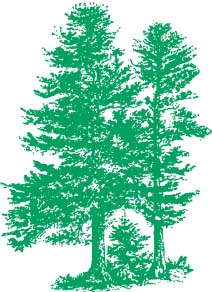Global Warming Linked To Plant Migration
New Study: As Temperatures Rise, Plants Move Up To High Elevations To Survive
LOS ANGELES, Aug. 11, 2008
(AP) Striking new research in the Southern California mountains suggests recent warming is behind a massive die-off and rapid migration to higher ground by nine different plants - from desert shrubs to white firs.
Within 30 years, most had moved to elevations 200 feet above their previous growth range. The findings provide a glimpse of what could happen to the world's vegetation as the Earth faces inevitable global warming.
Scientists have long warned that human-caused climate change threatens to turn plants into refugees as they migrate to higher, cooler spots to survive. The latest study is the first to physically measure changes in plants' locations in connection with regional warming - whether man-made or part of a normal cycle - over the past three decades.
"The speed (of the plant movement) is alarming," said ecologist Travis Huxman of the University of Arizona in Tucson, who did not participate in the study. "It means that we'll likely see vegetation shift a lot faster than we might think."
However, at least one expert suggested that prolonged drought - not climate change - could be the cause of the die-off and migration.
Researchers from the University of California, Irvine in 2006 studied the 10 most common plant species in the Santa Rosa Mountains east of Los Angeles at different elevations. With a measuring tape, they recorded the type of plant every 400 feet from sea level to over 8,000 feet, and compared the distribution to a survey that was done in the same area in 1977.
The Santa Rosa Mountains host diverse habitats, including conifer forest, chaparral, woodland and desert scrub. Since the 1970s, the region has seen average temperatures rise 2 degrees as well as extended periods of drought.
To scientists' surprise, they found scores of dead trees and shrubs at lower altitudes, but flourishing plants uphill. The habitats of nine of the 10 plant species studied crept an average 213 feet up the mountain face, the study found.
"The plant death was striking, and occurred in most species," said study co-author Michael Goulden of UC Irvine. "The occurrence of plant death was obvious to everyone living in that area."
The results appear in Monday's issue of the journal Proceedings of the National Academy of Sciences.
The findings counter the idea that fast-growing grasses are more flighty than large woody trees since the various plant species edged a similar distance upward in the study, scientists say.
U.S. Geological Survey research scientist Jon Keeley said the study provides convincing evidence of plant migration. But he said another factor, prolonged drought, rather than rising temperatures may be the driver behind the move.
"Drought certainly stands out as a real likely explanation. It is an extremely severe event" that could wipe out plants at lower elevations, he said.
Goulden of UC Irvine concurred that the 1999-02 severe drought can be partly blamed for killing plants, but he said drought alone cannot explain the uphill movement.
The researchers ruled out air pollution as a potential cause since they could not find signs of ozone damage to the plants. They also ruled out wildfire since the last major blaze to sweep through occurred more than a half century ago.
Though the researchers could not determine if the hotter temperatures in the region were due to greenhouse gas emissions or part of a natural warming cycle, they say the widespread plant death and migration observed is similar to global warming predictions.
